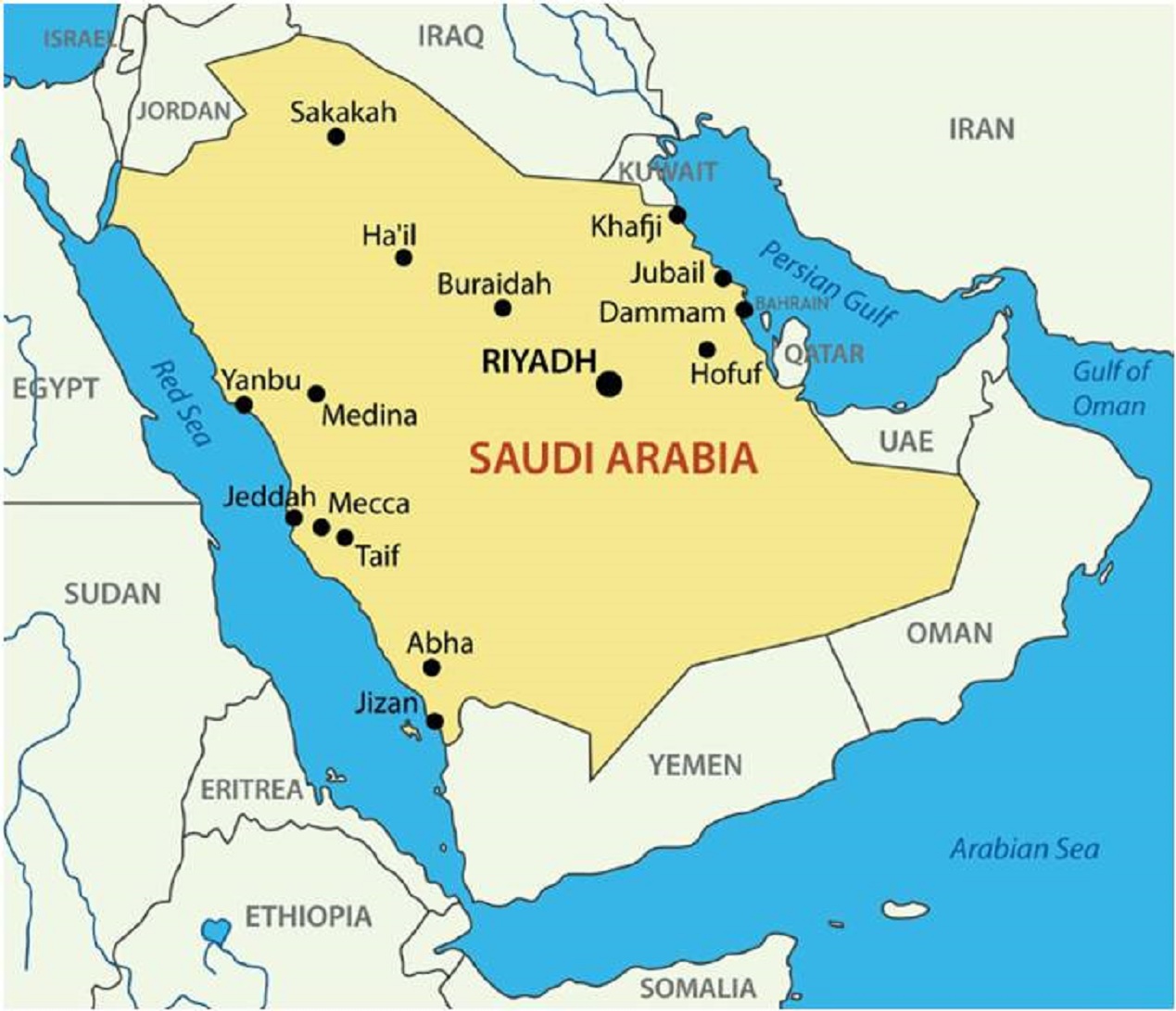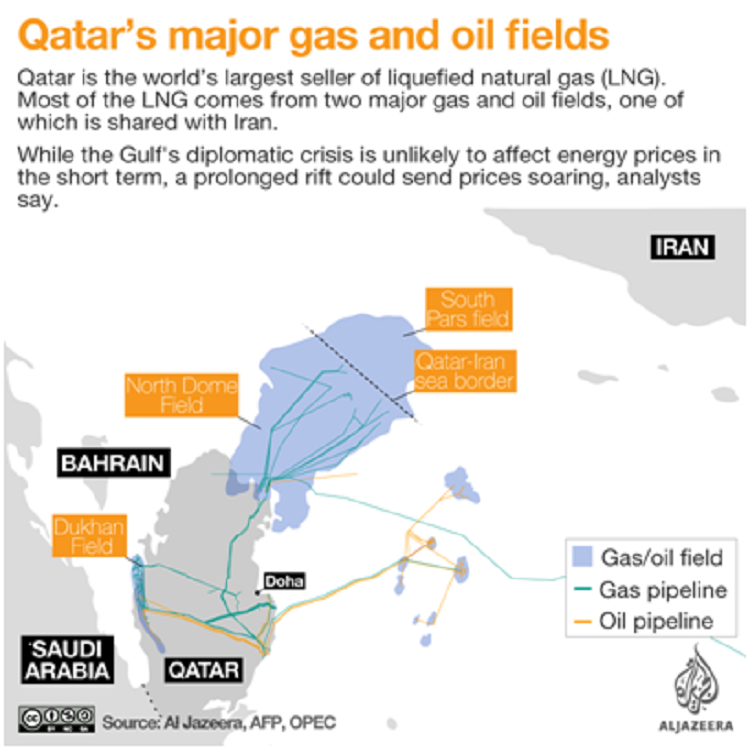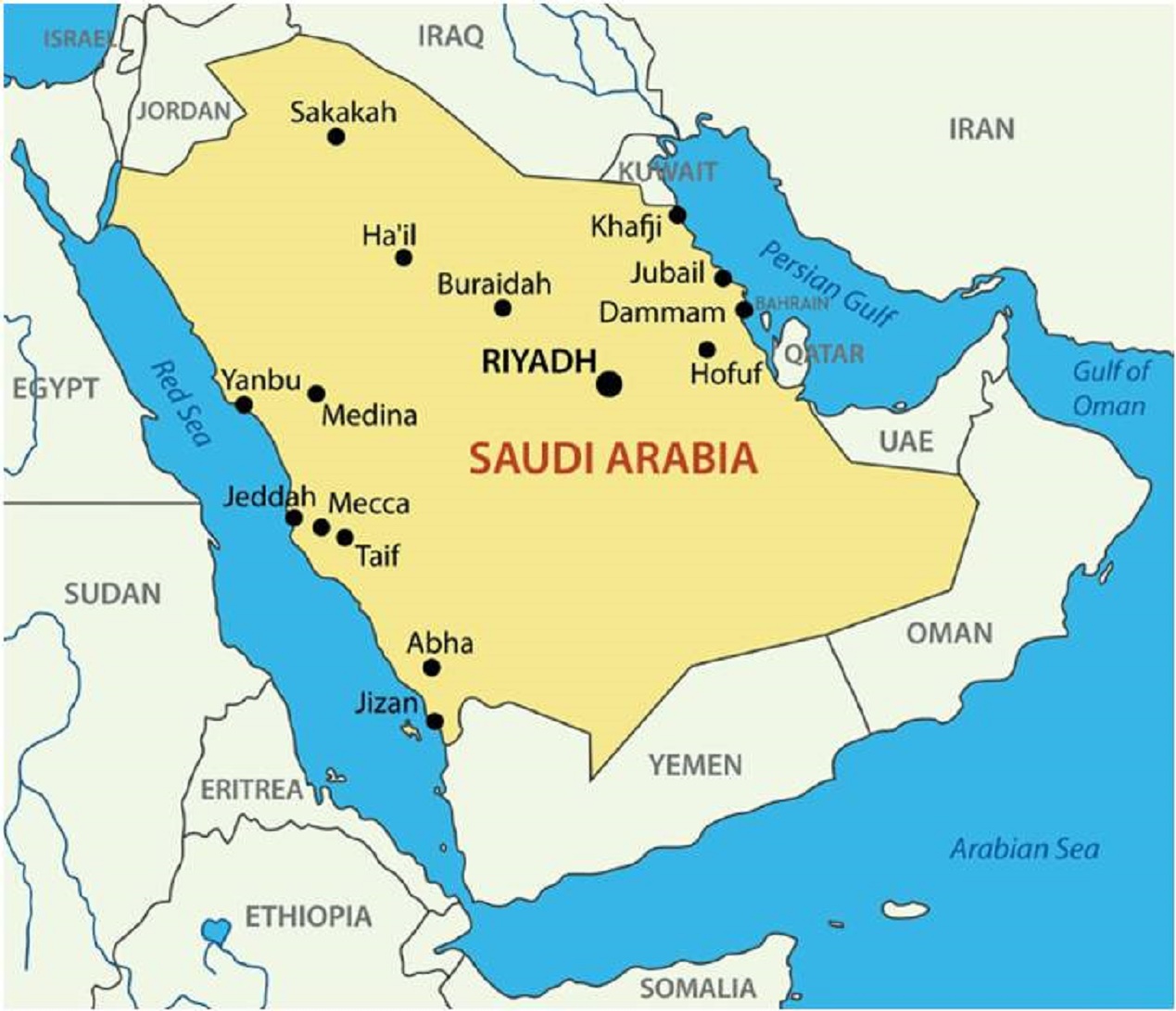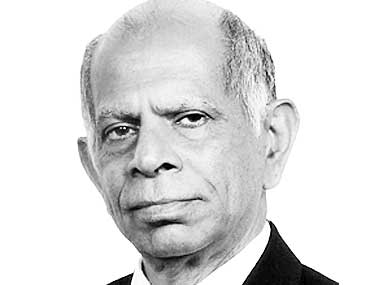The 5th of June 2020 marks a sad day in the annals of the 6-member GCC (Saudi Arabia, United Arab Emirates, Kuwait, Qatar, Oman, and Bahrain) founded in 1981. On 5th June 2017 the Crown Princes of Saudi Arabia and the U.A.E. broke off relations with Qatar, diplomatic, consular, transport, and trade. Bahrain, Egypt, and a few other states, all beholden to Saudi Arabia, the aid-giver, readily joined in the blockade.
Both Saudi Arabia and the U.A.E. were sure that within weeks Qatar, in sack cloth and ashes, would come to them and seek absolution. We can say with the benefit of hindsight that Riyadh and Abu Dhabi had erred in their judgment. Was not the outcome obvious even on day one?
The Genesis of the GCC
Let us briefly look at the reason for the existence of the GCC. In 1979 two events shook the Gulf. First, the Iranian Revolution that felled Shah Mohammed Reza Pahlavi put on the throne in 1941 by the U.S. and U.K., replacing his father, Reza Shah, the founder of the dynasty. Reza Shah was seen as a supporter of Nazi Germany.
The Shah worked closely with Washington and his fall was a blow to the U.S. strategy in the Gulf, rather centered around Iran.Ayatollah Khomeini, who led from exile the overthrow of the Shah, assumed supreme power in Iran and thundered from Teheran that Islam was incompatible with hereditary rule, a declaration that sent shock waves through the monarchies in the Gulf region that later formed the GCC. The fall of the Shah was in February 1979.
A the region was trying to digest the implications and consequences of a post- Shah Iran, the second shock came: the seizure of the Grand Mosque in Mecca by a group of armed men who declared the arrival of a Mahdi to restore Islam to its original glory and purity negating the legitimacy of the Saudi monarchy which claimed its legitimacy from being the ‘custodian’ of the holy shrines of Islam. This was in November and Saudi Arabia needed a team of French Commandos to recapture the mosque held by the rebels for days.
The GCC charter was signed in a summit held in Abu Dhabi on 25th May 1981. The charter projects an ambitious project of integration, politically and economically, keeping in mind the need to integrate, above all, for security. Article 4 spelling out the objectives says refers to “coordination, integration and inter-connection between Member States in all fields in order to achieve unity between them.” (Italics added.)1
The agenda was ambitious and the GCC registered commendable progress by establishing a Peninsular Shield Force (1984) common market (2008), and customs union (2015). The plan for a common currency fell through. Despite the remarkable progress, there were internal tensions principally stemming from Saudi Arabia’s claim to lead and Qatar’s refusal to be led. Qatar has a land boundary only with Saudi Arabia and all goods coming into Qatar by road have to come through Saudi Arabia. The exact boundary had been in dispute and minor incidents had taken place before the formal agreement in 2001.

An Abridged Timeline
2011
The Arab Spring dawns: Qatar sympathized with the Islamic Brotherhood in Egypt whereas Saudi Arabia stoodby Hosni Mubarak who fell from power in February 2011. Qatar endorsed President Morsi while Saudi Arabia and the U.A.E supported the Egyptian military that removed Morsi from power in July 2013. Some Islamic Brotherhood leaders fled to Doha; Riyadh objected to Qatar’s hosting them. The U.A.E. also took strong objection to Qatar’s support to the Brotherhood.
2014
In March Saudi Arabia, U.A.E., and Bahrain withdrew ambassadors from Doha in protest against Qatar’s support to the Muslim Brotherhood and ‘media campaign’ against them. The reference was to the Al Jazeera channel. The ambassadors came back to Doha in November after talks between Doha and the three capitals.
2017
May 20th
President Trump arrives in Riyadh, his first official visit abroad after taking office, to a magnificent welcome from heads of government and other high representatives from 50 plus Islamic states.
In a private conversation, Trump is believed to have given approval to a plan to ‘punish Qatar for its support of terrorism’.
23rd May
The website of the Qatar News Agency quoted the Amir as saying that Iran ‘as an Islamic power, cannot be ignored; Qatar had ‘tension’ with President Trump.
The Saudi media highlighted the Amir’s remarks.
Within hours it turned out that the website had been hacked.2
Later, the F.B.I. after investigations reportedly came to the conclusion that the U.A.E had paid for the hacking. However, the U.A.E. denied it.3
4th June
The email account of Yousef al-Otaiba, the UAE's ambassador to the United States, was hacked. The emails revealed ties between Otaiba and a pro- Israel think-tank in Washington, working together to move the US forward Central Command operations from the airbase in Qatar to the UAE.4
5th June
Saudi Arabia accused Qatar of “adopting various terrorist and sectarian groups aimed at destabilizing the region including the Muslim Brotherhood Group, Daesh [Islamic State] and Al-Qaeda”while announcing the break.5
The 13 Demands and an Ultimatum
In July 2017, in response to Washington’s asking for something in writing, Qatar’s foes came out with 13 demands:
- Scale down diplomatic ties with Iran and close the Iranian diplomatic missions in Qatar, expel members of Iran's Revolutionary Guard and cut off military and intelligence cooperation with Iran. Trade and commerce with Iran must comply with US and international sanctions in a manner that does not jeopardize the security of the Gulf Cooperation Council.
- Immediately shut down the Turkish military base, which is currently under construction, and halt military cooperation with Turkey inside of Qatar.
- Sever ties to all "terrorist, sectarian and ideological organizations," specifically the Muslim Brotherhood, ISIL,al-Quaeda , Fateh al-Sham (formerly known as the Nusra Front) and Lebanon's Hezbollah. Formally declare these entities as terror groups as per the list announced by Saudi Arabia, Bahrain, UAE and Egypt, and concur with all future updates of this list.
- Stop all means of funding for individuals, groups or organizations that have been designated as terrorists by Saudi Arabia, U.A.E., Egypt, Bahrain, US and others.
- Hand over "terrorist figures", fugitives and wanted individuals from Saudi Arabia, the UAE, Egypt and Bahrain to their countries of origin. Freeze their assets, and provide any desired information about their residency, movements and finances.
- Shut down Al Jazeera and its affiliate stations.
- End interference in sovereign countries' internal affairs. Stop granting citizenship to wanted nationals from Saudi Arabia, UAE, Egypt and Bahrain. Revoke Qatari citizenship for nationals where such citizenship violates those countries' laws.
- Pay reparations and compensation for loss of life and other financial losses caused by Qatar's policies in recent years. The sum will be determined in coordination with Qatar.
- Align Qatar's military, political, social and economic policies with the other Gulf and Arab countries, as well as on economic matters, as per the 2014 agreement reached with Saudi Arabia.
- Cease contact with the political opposition in Saudi Arabia, the UAE, Egypt and Bahrain. Hand over files detailing Qatar’s prior contact with and support for opposition groups and submit details of their personal information and the support Qatar has provided them.
- Shut down all news outlets funded directly and indirectly by Qatar, including Arabi21, Rassd, Al Araby Al Jadeed, Mekameleen and Middle East Eye, etc.
- Agree to all the demands within 10 days of list being submitted to Qatar, or the list will become invalid.
- Consent to monthly compliance audits in the first year after agreeing to the demands, followed by quarterly audits in the second year, and annual audits in the following 10 years.6
Why Qatar Rejected the Ultimatum?
In short, Qatar was required to scale down relations with Iran, shut the Turkish military base, stop support to Muslim Brotherhood, and close down Al Jazeera. Qatar rejected the ultimatum.
By way of background, Qatar shares the largest gas field in the world with Iran; the field has 51 trillion cubic meter of natural gas and 7.9 billion cubic meters of natural gas condensates; the total area is 9,700 sq.kms out of which 6,000 sq.kms are in Qatari territorial waters.

Obviously, Qatar cannot afford to take a hostile line with Iran. Moreover, Qatar Airways had no option but to overfly Iran, even more so as Saudi Arabia and the U.A.E denied it access to their air space.
Do we conclude that the demand was made knowing that Qatar cannot comply?
Turkey and Qatar agreed to have a Turkish military base in Qatar in 2014, but the base became active only after the blockade. It is only a small base.
In this context, it is to be recalled that Qatar got a U.S. air base at Al Udeid. Qatar built the base at a cost of $ 1 billion in 1996. Qatar wanted the Pentagon to have a base there for protection from an attack by the big neighbour.
The Story of AL Jazeera
Coming to Al Jazeera, there is a curious history behind it. In the 1990s the BBC and Saudi Arabia agreed to have an Arab language channel, with Saudi funding, with the BBC having full editorial control. Many BBC journalists were recruited, but the channel could not start as Saudi Arabia had second thoughts about editorial control. It wanted a say in editorial matters, the BBC rejected the demand, and the plan fell through. Spotting an opportunity Qatar jumped in, employed the journalists and started Al Jazeera. This happened when the writer was Ambassador in Doha.
Al Jazeera has established a reputation for itself and its coverage of developments in Saudi Arabia or the U.A.E has not been always appreciated by the two governments. In fact, while visiting Al Jazeera in 2019, the writer was told that they were fearing a bomb attack on the night of 5th June 2017.
Qatar will find it difficult to shut down the channel, but some accommodation on coverage of developments in the region might be possible.
Qatar’s Vigorous Response
Far from being intimidated by the blockade, Qatar stood up showing resilience and a commendable degree of patience and tact. It never used any harsh language against the blockaders. It did not expel the 300,000 Egyptians working in Qatar. It did not stop the export of gas to the U.A.E whose production of electricity needed the gas. Qatar imported cows and became self-sufficient in dairy products entirely imported before the blockade. It worked on convincing President Trump that it had not funded terrorism and imported huge amount of arms from the U.S.
The Role of the U.S.
Without the nod of approval from President Trump, Riyadh and Abu Dhabi might not have broken off with Qatar. While the White House went on showing support to Saudi Arabia, implying that Qatar was at fault, the State Department and the Pentagon took a different line. They pointed out to Trump that the Pentagon had its biggest air base in the region in Qatar and that it was in the interest of the U.S. to work out a compromise. The State tried, but without the support of the White House, it failed. Gradually, Trump accepted the need for a settlement and the latest is that Washington has asked U.A.E. and Saudi Arabia to open their air space to Qatar. Let us see what might happen even as we note that by withdrawing the Patriot missiles from Saudi Arabia in May 2020 Trump has not enhanced his leverage over that state. The missiles were sent following attacks on Saudi oil installations on 14th September 2019 bringing down the daily production by 50%. Trump took the decision to remove the missiles in retaliation to the Saudi refusal to scale down production as the oil prices fell.
India’s Approach to the Blockade
India displayed commendable navigational skills through the tricky waters of inter-GCC rift. Some pundits had urged India to offer mediation. New Delhi wisely refrained. India has strengthened and deepened its relations with the six member-states of the GCC without getting drawn into their quarrels. India has over 8 million of its nationals in the GCC countries and its policy of not getting embroiled in the conflict has paid handsome dividends.
Kuwait/Oman Mediation Efforts
It should be noted that Kuwait and Oman refused to join the blockade against Qatar. The two, Kuwait more than Oman, have tried to work out a compromise.
Is a Settlement on the Cards?
There is need for a face-saving formula as there is a stalemate costing heavily to both sides, more to the blockaders than to the blockaded. We have seen that the 13 demands are a non-starter. In any case, the initiative to end the blockade belongs to those who started it.
Perhaps, a settlement can come as part of an overall settlement when Riyadh realizes that the war in Yemen, the confrontation with Iran and also with Qatar have to be brought to an end in the context of Covid-19 and the fall in revenue from oil.
Much will depend on the November presidential election in the U.S. The Democrats are critical of the Saudi Crown Prince on many issues including the horrible murder of the Washington Post journalist Khashoggi in the Saudi Consulate General in Istanbul on 2nd October 2018.
The ardent well-wishers of the GCC member-states, in India and the rest of the world, would hope that a re-united GCC will celebrate its 40th anniversary with much éclat in May 2021.
Endnotes
- International Relations and Security Network, Zurich, https://www.files.ethz.ch/isn/125347/1426_GCC.pdf
- https://www.bbc.com/news/world-middle-east-40026822
- https://www.bbc.com/news/world-middle-east-40630602
- https://theintercept.com/2017/06/03/hacked-emails-show-top-uae-diplomat-coordinating-with-pro-israel-neocon-think-tank-against-iran/
- https://www.nbcnews.com/news/world/egypt-saudi-arabia-among-gulf-states-cutting-ties-qatar-n768161
- https://gulfnews.com/world/gulf/qatar/what-are-the-13-demands-given-to-qatar-1.2048118
(The paper is the author’s individual scholastic articulation. The author certifies that the article/paper is original in content, unpublished and it has not been submitted for publication/web upload elsewhere, and that the facts and figures quoted are duly referenced, as needed, and are believed to be correct). (The paper does not necessarily represent the organisational stance... More >>










Post new comment